Sunset in subtropical Chiayi (嘉義) is as many-hued as the local palate. The afternoon rain on the streets reflect the sky as it turns pink and purple. As the city’s neon lights flare into life, everywhere, it seems, signposts dinner.
Evening commences along the half-a-kilometer long night market on Wenhua Road (文化路). This strip featured in the Netflix series Street Food Asia.
There are fish-head noodle stalls and grapefruit bubble tea vendors, onion pancake and squids-on-sticks, Vietnamese sandwiches, tofu and sizzling pork skewers.
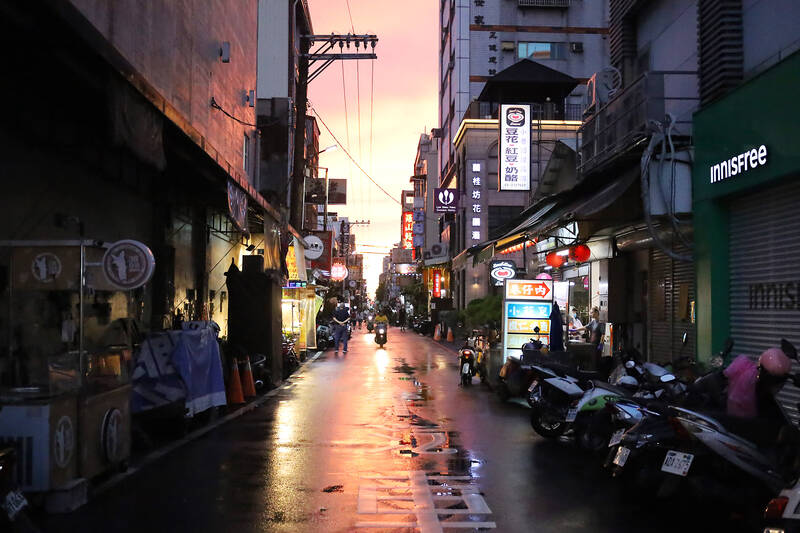
Photo Thomas Bird, Taipei Times
The heady scent of barbequing king oyster mushrooms catches my attention. After a fungi-licious appetizer, I sit down for a main course — cold noodles, Chiayi-style — with cucumbers, beansprouts, sesame seed paste and special ingredient, mayonnaise.
“That’s how we do it here, it holds the noodles together,” the vendor says.
FIRST PORT OF CALL
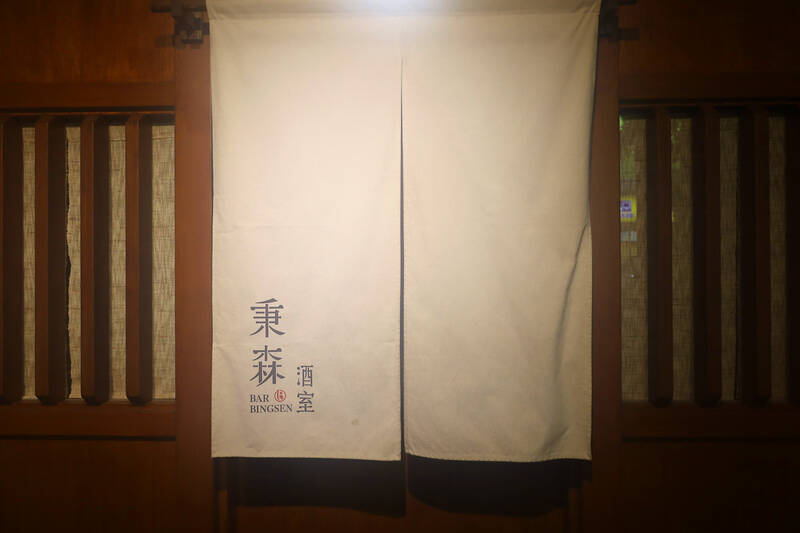
Photo Thomas Bird, Taipei Times
With my stomach lined, it’s a short hike to the end of Wenhua Road, where, at the crossroads of the Alishan mountain railway, I aim for Calgary (卡加利美式餐廳), which was recommended to me by an old-Chiayi-hand as “a pub with a railway flavor.”
The bar manager tells me Calgary has been in business since the late-1990s although the building itself, where “Timber was brought from the mountains to be chopped and turned into furniture,” is far older.
Logging officially ended in 1988 but much of city’s sites still allude to Chiayi’s former life as Taiwan’s “city of timber” and the railroad culture that kept that resource economy rolling.
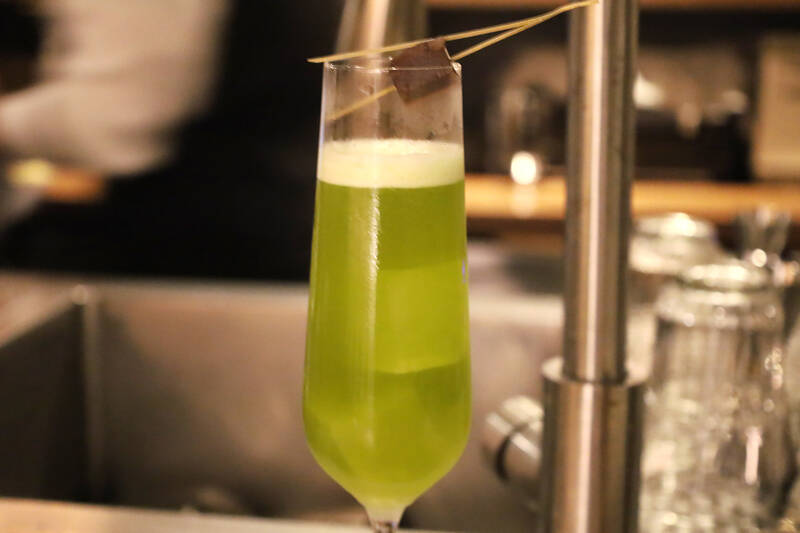
Photo Thomas Bird, Taipei Times
Calgary’s vintage address is redolent of old Chiayi, but it is otherwise the kind of watering hole you might find in any small city in Asia — a place where barflies prop up the bar and put the world to right over pints of Carlsberg (NT$220) and Hawaiian Pizza (NT$360) until the weekend band kicks in. Notwithstanding its “last chance coral” vibes, I like Calgary, which boasts many of the “elements of a great bar” Anthony Bourdain once listed in A Cook’s Tour, notably convivial staff ever eager to top up your glass.
COCKTAILS AND FOOD PANDA
Walking through the curtains into Bar Bingsen (秉森酒室) is like stepping into a wormhole leading directly to Shinjuku, Tokyo. This perfect imitation of an izakaya is only a five-minute walk along the railway from Calgary but it feels a world apart.
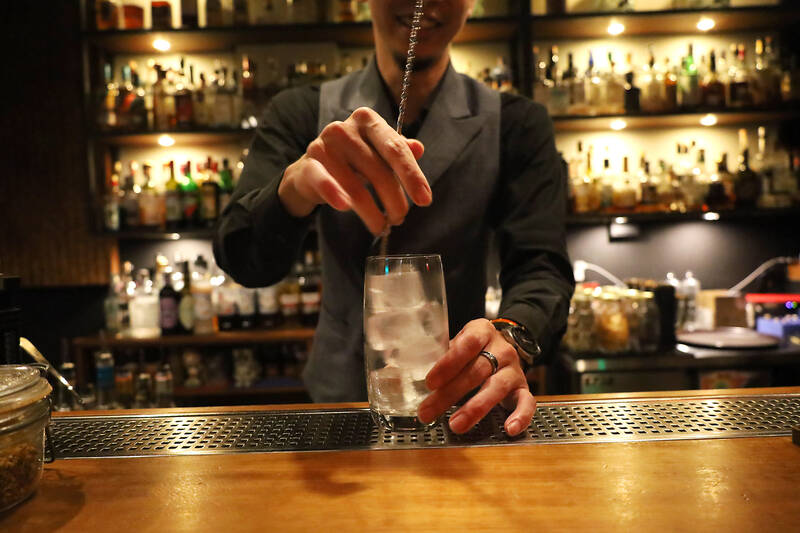
Photo Thomas Bird, Taipei Times
Despite its imitative pretentions, there are no suited company men bonding over whisky and cigarettes as you might find in Japan. Instead, Bingsen is the habitat of hip Chiayi locals sipping Instagramable cocktails while ordering snacks from their phones via the Food Panda app.
“You can order outside food but you must buy drinks here,” the barman says of the house rules.
I’m well-fed but getting watered won’t be quite so economical, I soon discover, while eying the drinks list with average drink prices between NT$300 to NT$400.
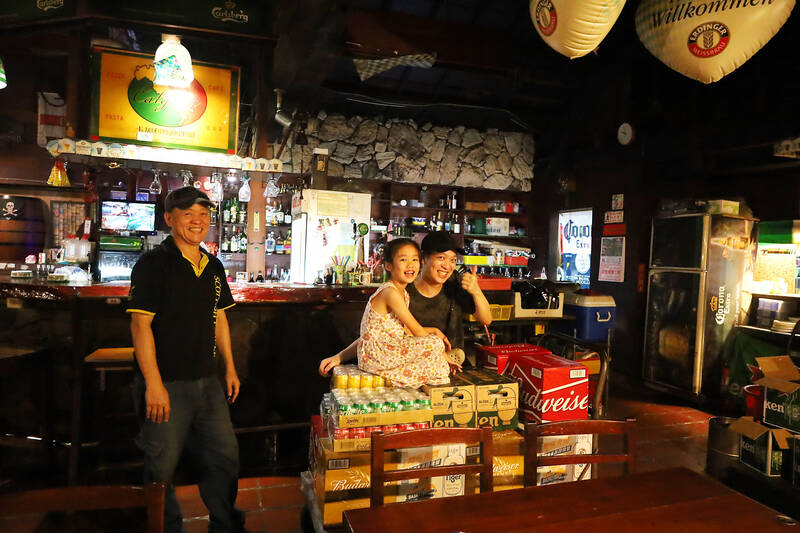
Photo Thomas Bird, Taipei Times
Still, what is cool about Bar Bingsen is the range of locally-inspired concoctions — cocktails with poetic names like Sea of Flowers Amidst the Bustle (NT$420), a sumptuous gin-based beverage infused with cherry blossom and camphorwood and Town With and Ocean View (NT$360) made with vodka, buckwheat, elderflower and honey.
Equal attention has been given to the service — from the debonair attire of the barmen to the immaculate open bar, where they mix beverages to a jazz soundtrack.
Yet while Bingsen’s young clientele seem satisfied fetishizing colorful drinks, the place is bit stiff for a laidback southern town.
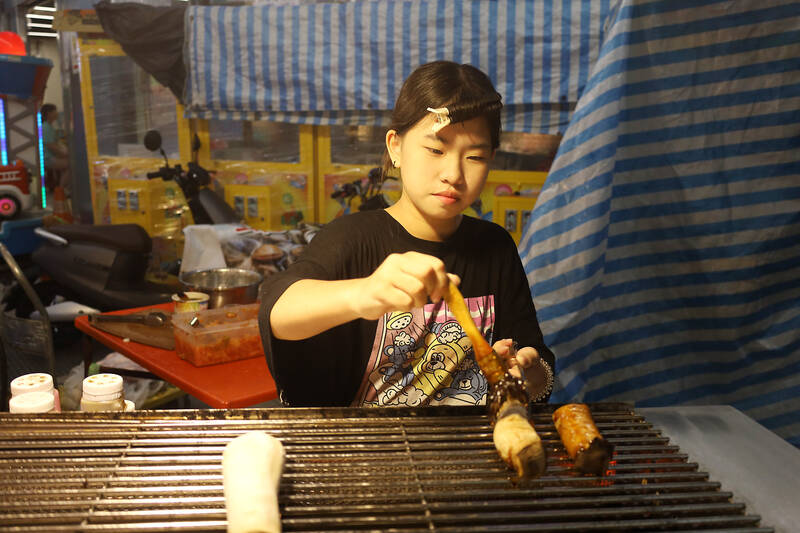
Photo Thomas Bird, Taipei Times
TIKI IN CHIAYI
Following the directions of a Bingsen regular, I pass Chiayi Railway Station’s forecourt and facing the Chiayi Art Museum find HOT Hi-End Of Tiki.
The exterior is adorned with collage of wild tropical animals, the interior decorated like a classic American cocktail lounge.
“I learned to be a mixologist in Taipei but wanted to bring this culture back to my hometown,” says Wang Wei-chi (王湋際), who opened the bar in 2021.
Wang survived coronavirus-enforced restrictions and now employs two local students to help him cater to a regular cast of patrons.
“Old people don’t get it but young people like what we do here.”
I order a Seasonal G&T (NT$300) — a predictable tipple for a Brit in the subtropics — but Wang mixes it in an atypical way, with a liqueur that he makes with four different kinds of fruit.
I repeat what the barman at Bingsen had told me, that cocktail bars were mushrooming in Chiayi, because it’s “a fresh market” that’s “not been saturated like elsewhere.”
Wang agrees, although he notes low rent when compared with Taipei keeps overheads down, which, combined with a flow of tourists bound for Alishan, makes opening a cocktail bar in Chiayi a more sensible idea than it might first appear.
I conclude with a Jungle Smack (NT$300), a delicious, banana-flavored bourbon with bitters, then stumble off to my hotel.
En route, I think about Street Food Asia and TV chef Johanna Liu’s (劉韋彤) assertion that, “Because of the secluded location, Chiayi has not been very influenced by foreign culture.”
As one of Taiwan’s oldest settlements, Chiayi unquestionably maintains some fine Taiwanese traditions. But it’s also seen some history. From the eclecticism of night market through to its varied night haunts, I’ve tasted a myriad influences in my short tour.
Sure, Chiayi might be small, but provincial it is not.
Warning: Excessive consumption of alcohol can damage your health.

This month the government ordered a one-year block of Xiaohongshu (小紅書) or Rednote, a Chinese social media platform with more than 3 million users in Taiwan. The government pointed to widespread fraud activity on the platform, along with cybersecurity failures. Officials said that they had reached out to the company and asked it to change. However, they received no response. The pro-China parties, the Chinese Nationalist Party (KMT) and Taiwan People’s Party (TPP), immediately swung into action, denouncing the ban as an attack on free speech. This “free speech” claim was then echoed by the People’s Republic of China (PRC),

Exceptions to the rule are sometimes revealing. For a brief few years, there was an emerging ideological split between the Democratic Progressive Party (DPP) and Chinese Nationalist Party (KMT) that appeared to be pushing the DPP in a direction that would be considered more liberal, and the KMT more conservative. In the previous column, “The KMT-DPP’s bureaucrat-led developmental state” (Dec. 11, page 12), we examined how Taiwan’s democratic system developed, and how both the two main parties largely accepted a similar consensus on how Taiwan should be run domestically and did not split along the left-right lines more familiar in

Many people in Taiwan first learned about universal basic income (UBI) — the idea that the government should provide regular, no-strings-attached payments to each citizen — in 2019. While seeking the Democratic nomination for the 2020 US presidential election, Andrew Yang, a politician of Taiwanese descent, said that, if elected, he’d institute a UBI of US$1,000 per month to “get the economic boot off of people’s throats, allowing them to lift their heads up, breathe, and get excited for the future.” His campaign petered out, but the concept of UBI hasn’t gone away. Throughout the industrialized world, there are fears that

Most heroes are remembered for the battles they fought. Taiwan’s Black Bat Squadron is remembered for flying into Chinese airspace 838 times between 1953 and 1967, and for the 148 men whose sacrifice bought the intelligence that kept Taiwan secure. Two-thirds of the squadron died carrying out missions most people wouldn’t learn about for another 40 years. The squadron lost 15 aircraft and 148 crew members over those 14 years, making it the deadliest unit in Taiwan’s military history by casualty rate. They flew at night, often at low altitudes, straight into some of the most heavily defended airspace in Asia.